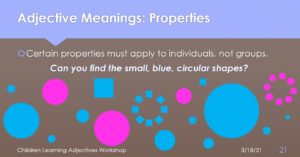
On 18th March 2021, Cat Davies and Cecilia Zuniga-Montanez ran an online Continuing Professional Development workshop for researchers, teachers, clinicians and other professionals working with descriptive language. The three main objectives were to share research findings about how children learn descriptive language across academic, clinical and educational sectors, to explore how we can all contribute to promoting adjective learning, and to develop further opportunities for collaborative work.
We had an amazing turnout with 77 attendees joining from all over the world. Most were based in the UK, but there were also people joining from the Netherlands, USA, Switzerland, Kuwait, and India. Most attendees were clinicians, researchers, or teachers, but we were also joined by several early years practitioners, education consultants, students, and other professionals.
In the first part 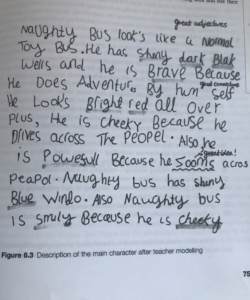 of the event, we were joined by six expert speakers from different fields who discussed their work with descriptive language. The first speaker was Samantha Wilkes, a Lecturer in Primary Education at the Institute of Childhood, Leeds Trinity University, with over 20 years’ experience in primary education. Samantha discussed adjective learning and teaching in the Early Years and Key Stage 1 curriculum. She was followed by Sarah White, a Speech and Language Therapist and Senior Lecturer at Leeds Beckett University, who discussed clinical perspectives on adjective learning in children. Both of them shared resources to promote adjective learning in educational and clinical practice.
of the event, we were joined by six expert speakers from different fields who discussed their work with descriptive language. The first speaker was Samantha Wilkes, a Lecturer in Primary Education at the Institute of Childhood, Leeds Trinity University, with over 20 years’ experience in primary education. Samantha discussed adjective learning and teaching in the Early Years and Key Stage 1 curriculum. She was followed by Sarah White, a Speech and Language Therapist and Senior Lecturer at Leeds Beckett University, who discussed clinical perspectives on adjective learning in children. Both of them shared resources to promote adjective learning in educational and clinical practice.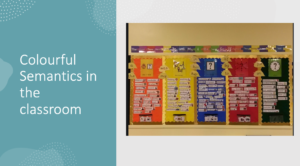
We were then joined by two Associate Professors all the way from the United States. Dr Kristen Syrett talked about what adjectives are, their various types and properties, and how caregivers can highlight adjectives in their speech. She was followed by Dr Sudha Arunachalam who shared how researchers investigate children’s adjective learning, and some of the techniques and equipment that they use.
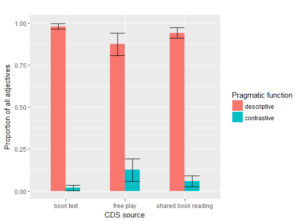
Our fifth speaker was Dr Jamie Lingwood. Jamie showed the patterns of adjectives that children hear from their caregivers during different activities. He also discussed how caregivers can be encouraged to use descriptive language in child-directed speech. Our final speaker was Dr Elena Tribushinina, who joined us from the Netherlands. Elena discussed how toddlers process adjectives in real time, how caregivers use adjectives in their speech, and how caregivers can support children’s processing of adjectives.
After the talks, we had a discussion session where, in small groups, attendees shared the opportunities and challenges involved in working cross-sector. One of the most commonly shared views was that there is an urgent need for more collaborative work between fields. The challenges that researchers, practitioners, and teachers face were also shared. For example, sometimes teachers and speech and language therapists do not have access to information about evidence-based research when supporting adjective learning. This highlighted the importance of more events such as this one, where professionals from different fields can come together, share their work, and develop ideas for collaborative work. Finally, different ideas on how to link the work from researchers, clinicians and teachers were proposed, for example by exploring learning through art, drama and music.
The event ended with a reflection of what each person was going to take home and share with their colleagues, e.g.
I will be sharing with teachers and parents the importance of adjectives, language development and some key strategies.
I will definitely be thinking about how to collaborate my SLT goals with Teaching goals.
I will follow up with colleagues about ways that their work might intersect with mine. I will think how I can collaborate with people from other fields.
Brilliant insights into how SLTs and practitioners teach adjectives in the real world and how researchers investigate descriptive language.
We are delighted that this event brought together people working with descriptive language across different fields. Our next steps are to work with the invited speakers and some of the delegates to produce practitioner reports containing research findings, case studies, and recommendations for practice and research.
If you would like to view the resources and talks from the event, please visit our event website.
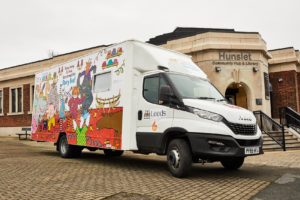



 of the event, we were joined by six expert speakers from different fields who discussed their work with descriptive language. The first speaker was Samantha Wilkes, a Lecturer in Primary Education at the Institute of Childhood, Leeds Trinity University, with over 20 years’ experience in primary education. Samantha discussed adjective learning and teaching in the Early Years and Key Stage 1 curriculum. She was followed by Sarah White, a Speech and Language Therapist and Senior Lecturer at Leeds Beckett University, who discussed clinical perspectives on adjective learning in children. Both of them shared resources to promote adjective learning in educational and clinical practice.
of the event, we were joined by six expert speakers from different fields who discussed their work with descriptive language. The first speaker was Samantha Wilkes, a Lecturer in Primary Education at the Institute of Childhood, Leeds Trinity University, with over 20 years’ experience in primary education. Samantha discussed adjective learning and teaching in the Early Years and Key Stage 1 curriculum. She was followed by Sarah White, a Speech and Language Therapist and Senior Lecturer at Leeds Beckett University, who discussed clinical perspectives on adjective learning in children. Both of them shared resources to promote adjective learning in educational and clinical practice.

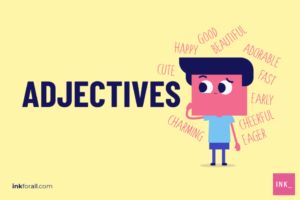
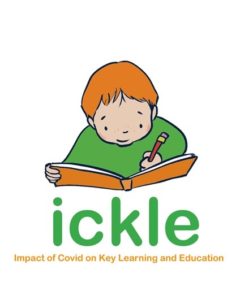
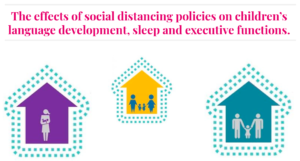
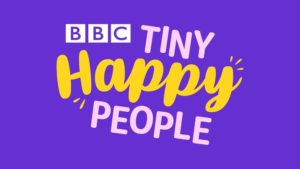 resident language scientists featuring in the
resident language scientists featuring in the 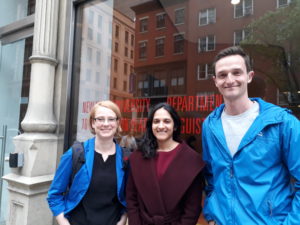 We were fortunate enough to have spent a week in late April visiting
We were fortunate enough to have spent a week in late April visiting